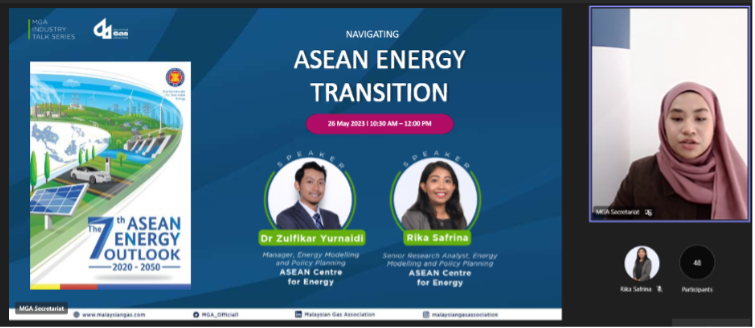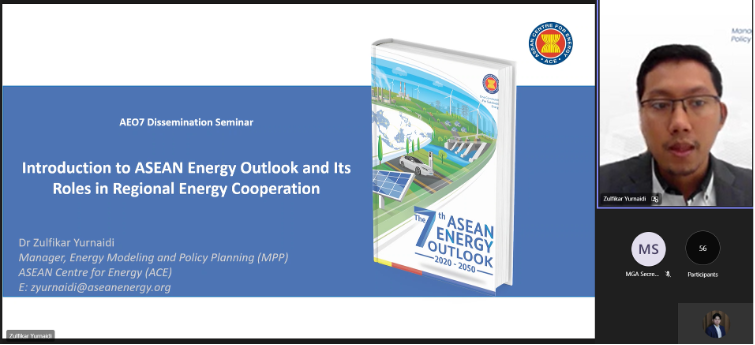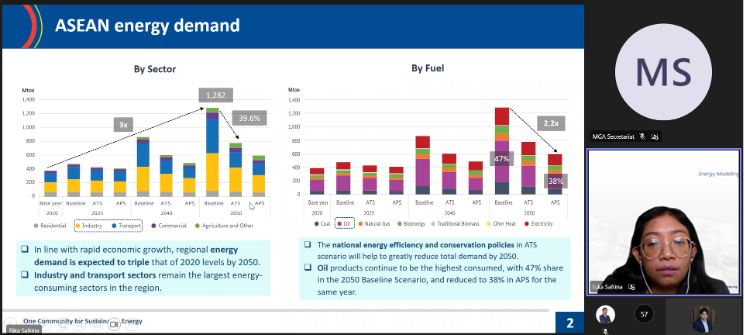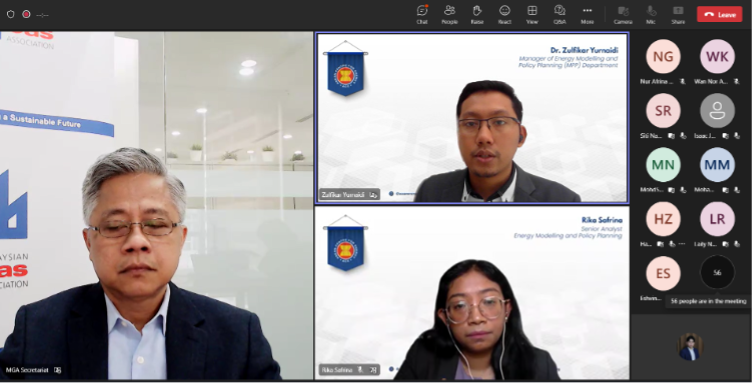Menu
The ASEAN Centre for Energy (ACE) was invited by the Malaysian Gas Association (MGA) to present the 7th ASEAN Energy Outlook (AEO7) in an exclusive webinar called “MGA’s Industry Talk #2: Navigating ASEAN Energy Transition” on Friday, 26 May 2023.
The session was opened by a welcoming remark from Mr Sukiman Mohamed, Leader of the Learning and Development Working Committee at MGA, who emphasised the importance of gas as a more environmentally friendly alternative to coal and the need to prioritise efforts in pushing for its increased usage to achieve lower emission electricity production. Recognising the global shift towards net zero emissions, he highlighted the necessity of significant investments in infrastructure and the development of supportive policies to facilitate a smooth energy transition. Mr Sukiman hoped the session would address how Malaysia and other ASEAN countries can fulfil their energy transition targets.

In the subsequent session, Dr Zulfikar Yurnaidi, Manager of Energy Modelling and Policy Planning (MPP) at ACE, delivered a presentation outlining the ACE’s roles and responsibilities as a think tank, catalyst, and knowledge hub representing the interests of the 10 ASEAN member states in the energy sector. He then delved into the ASEAN Plan of Action for Energy Cooperation (APAEC) 2016-2025 Phase II: 2021-2025, which aims to enhance energy connectivity and market integration within ASEAN to attain energy security, accessibility, affordability, and sustainability.
Dr Zulfikar highlighted the significant role played by the ASEAN Energy Outlook (AEO) in complementing the APAEC and establishing pathways to achieve regional targets. He proceeded to explain the methodology employed in the development of AEO7, which encompasses four scenario types for projections: Baseline Scenario, AMS Target Scenario (ATS), APAEC Targets Scenario (APS), and Least-Cost Optimization (LCO). Additionally, Dr Zulfikar detailed the key analyses conducted within AEO7, encompassing the monitoring and projection of targets, technologies, and policies, as well as secondary analyses involving emissions, land use, and other relevant factors.

Following the presentation, Ms Rika Safrina, ACE’s Senior Analyst of MPP, presented the findings and recommendations of AEO7. She commenced by discussing the projected trend of ASEAN’s energy demand, which is anticipated to triple by 2050 compared to 2020 levels. Highlighting the baseline scenarios, she emphasised that oil consumption is expected to hold a 47% share of total consumption by 2050. Ms Rika underscored the need to combine energy efficiency measures with an increased share of renewable energy to meet the APAEC targets by 2025. Furthermore, she addressed the importance of addressing energy security concerns, particularly regarding import dependency. Notably, she concluded that ASEAN is projected to become a net importer of natural gas starting from 2025 and coal from 2039.
Continuing her presentation, Ms Rika delved into the evolving electricity generation system, the cost of power generation, the progress and projections of APAEC’s energy efficiency and renewable energy targets, and the potential for green job creation. She elaborated on the variations in results across different scenario models. Concluding her presentation, Ms Rika shared policy recommendations for the power and supply sectors, as well as the end-use sector, to navigate a secure and resilient energy transition.

Following this section was a moderated discussion, where the participants could ask questions to the speakers. During this session, several important topics were discussed. Among them were energy security, gas supply, and the realisation of infrastructure connectivity in the ASEAN countries under the Trans-ASEAN Gas Pipeline (TAGP) framework, considering each country’s increasing emphasis now on renewable energy rather than fossil fuels. The other question delved into the concept of the energy transition, specifically addressing the 4Ds: decarbonisation, digitalisation, decentralisation, and democratisation. These inquiries provided valuable insights into the challenges and opportunities surrounding natural gas in the energy transition journey within the ASEAN region.

